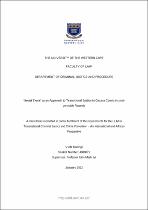| dc.contributor.advisor | Iyi, John-Mark | |
| dc.contributor.author | Karungi, Viola | |
| dc.date.accessioned | 2022-03-22T07:54:25Z | |
| dc.date.available | 2022-03-22T07:54:25Z | |
| dc.date.issued | 2021 | |
| dc.identifier.uri | http://hdl.handle.net/11394/8948 | |
| dc.description | Magister Legum - LLM | en_US |
| dc.description.abstract | This mini-thesis makes a claim that when Rwanda established the rule of Gacaca court system as a communal mechanism of transitional justice in the aftermath of the 1994 genocide, it accordingly enabled space for the ‘social truth’ to take centre stage as opposed to the legal truth. As such, testimonies by perpetrators and accounts by witnesses could only be permissible in Gacaca courts if they were socially acceptable by the community, and any evidence only needed to be orally validated by community members but not verified through formal legal procedures. The principal objective of this mini-thesis, therefore, is to examine how the ‘social truth’ was employed by Gacaca courts and how this kind of truth resonated with the communal nature of the courts. | en_US |
| dc.language.iso | en | en_US |
| dc.publisher | University of Western Cape | en_US |
| dc.subject | Social truth | en_US |
| dc.subject | Gacaca Courts | en_US |
| dc.subject | Transitional justice | en_US |
| dc.subject | International criminal law | en_US |
| dc.subject | Genocide | en_US |
| dc.title | ‘Social truth’ as an approach to transitional justice in gacaca courts in post- genocide Rwanda | en_US |
| dc.rights.holder | University of Western Cape | en_US |

